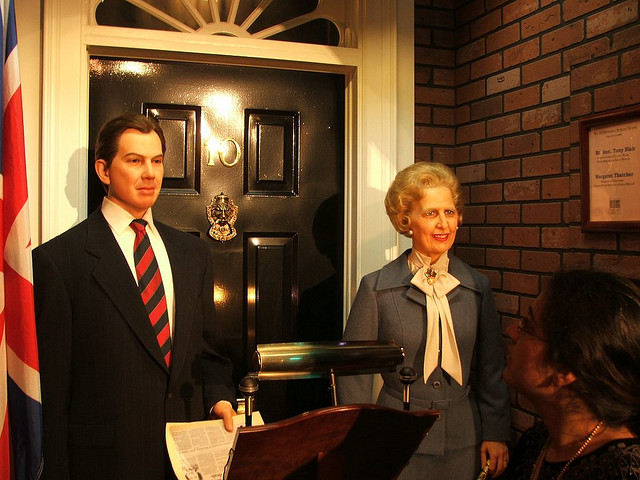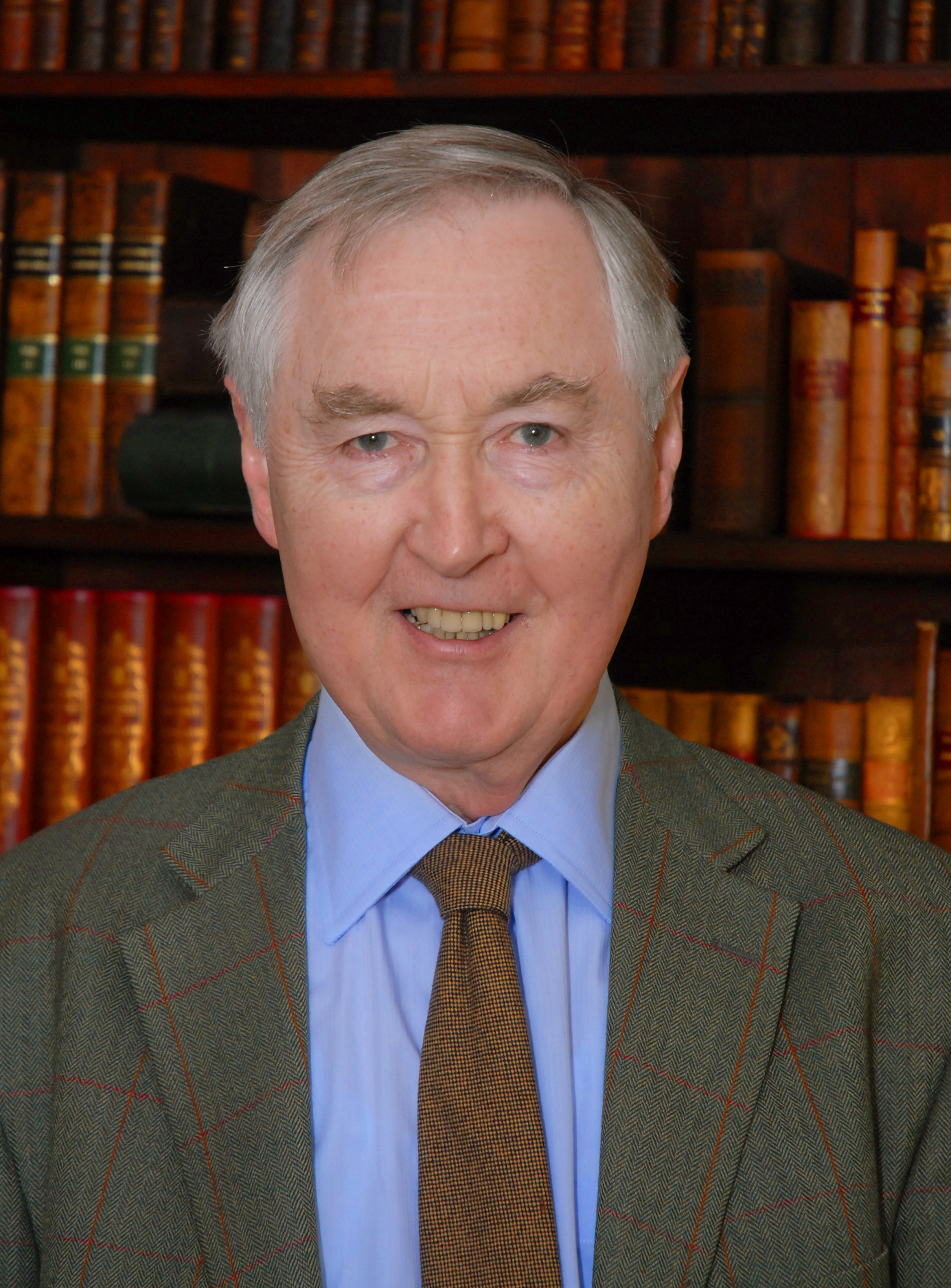Professor Archie Brown on the ‘dangerous myth’ of the strong leader
In politics, it is generally seen as a good thing to be considered a ‘strong leader’, with Tony Blair and Margaret Thatcher often used as examples of the dovetailing of strength, electoral success, and policy achievement. But is this necessarily the case? In a new book, ‘The Myth of the Strong Leader‘, Archie Brown argues that this widely held belief is not only wrong, but most likely dangerous, too. Democratic Audit asked Professor Brown to answer some questions about his argument, with part one of two appearing below.

Tony Blair and Margaret Thatcher both embody the notion of the ‘strong leader’ (Credit: Umesh Unnikirshnan, CC BY-NC-ND 2.0)
In democracies, it is generally seen as a good thing to be a ‘strong leader’, both in electoral terms, and in terms of achieving meaningful policy and political gains. In which ways is this widely held view incorrect?
The electoral importance of party leaders is greatly exaggerated. They count for something when voters enter the voting booth but for far less than is widely assumed. It is extremely rare for the standing of the leader to make the difference between victory and defeat for a political party, and not especially uncommon for the more popular leader, if we take the example of the Labour and Conservative parties in Britain, to finish on the losing side. Thus, Harold Wilson’s opinion poll standing was significantly higher than Ted Heath’s when the Conservatives won the 1970 election and Jim Callaghan had a lead of more than twenty points over Margaret Thatcher when the Conservatives had a very comfortable victory in 1979. In the most recent (2010) general election, Nick Clegg was acclaimed as the star of the campaign by the mass media and as the winner of the televised debates. The Liberal Democrats managed to increase their popular vote, but by a less than massive 1 per cent (which probably owed at least as much to disillusioned Labour voters as to the personality of Clegg) and finished up with five fewer seats than they had in the previous election.
There is a substantial literature in comparative politics on the leader effect in parliamentary elections. The bulk of the evidence points to the strict limits on how much difference the leader can make. The Finnish political scientist, Lauri Karvonen (in a book published by the ECPR in 2010), brought many of the data together in a comparative study of ‘personalisation’ in major parliamentary democracies. He concluded that ‘leaders’ personalities and citizens’ assessments of political leaders have not become a prime determinant of voter choice or electoral outcomes’. While they have ‘a discernible effect on voter choice’, this is ‘dwarfed by such “usual suspects” as party identity and preferences, as well as by socio-economic factors’.
On the second part of the question you put to me, I define a ‘strong leader’, quite conventionally, as one who dominates the policy process and his or her party and cabinet and aspires to take all the big decisions. In The Myth of the Strong Leader, I discuss these leaders in different political systems – in authoritarian regimes (where a more collective leadership is usually a lesser evil than personal dictatorship), in regimes making a transition from authoritarian rule to democracy (where inclusiveness and collegiality are important for the success of the project, as opposed to a ‘winner-takes-all’ approach) and in democracies. It seems to me to be evident that the more one individual top leader attempts to take all the big decisions, and is expected or allowed to do so, the greater the scope for major error.
The more decisions are referred up to the person at the top, the less time that ‘strong’ and assertive leader has for grasping the pros and cons of each policy. That becomes a very poor substitute for collective decision-making in cabinet committee or (if we are talking about foreign policy) in a National Security Council (which in the UK was established as recently as 2010). In their excellent book, The Blunders of Our Governments, Anthony King and Ivor Crewe note that political decisions which need to be taken secretly and within just a few hours are very much the exception rather than the rule. In most areas of policy, there is ample scope for more serious, collective deliberation than typically takes place. It is not only Prime Ministers and party leaders who can be guilty of high-handed failure to consult sufficiently widely and listen to critical voices. Other senior ministers – and notably, Chancellors of the Exchequer – are often enough guilty of this, too. Part of it is connected with a macho desire to be seen as a strong and decisive leader. Many of the egregious ‘blunders’ discussed by King and Crewe were attributable to ‘power hoarding’.
What role does the press have in perpetuating the ‘myth’ of the strong leader?
The press does play a great role in this. The mass media speak of Tony Blair, Gordon Brown or David Cameron as Prime Minister doing this, that and the other, even when – in many of these cases – they are discussing a government policy of which the head of the government was very far from having been the prime mover. If we take, for example, the constitutional reforms which were probably the most important legacy of the government headed by Blair from 1997 to 2007, most of them – including Scottish and Welsh devolution and the Freedom of Information Act – were policies thrust upon him rather than ones he enthusiastically embraced. The main exception was the Northern Ireland settlement where Blair did, indeed, play an important part.
If there is criticism within a political party of a policy favoured by the leader or if there is a significant number of abstentions or revolts in a House of Commons vote by MPs on one side of the House, the leader of that party is mocked by the mass media (and by politicians from other parties, it is only fair to add) for having ‘lost control of his party’. But how much ‘control’ is it appropriate for leaders of political parties in a democracy to have over the people who put them where they are? Politicians are elevated to the leadership of their parties for a wide variety of reasons, but never because they are assumed to have a monopoly of political wisdom. When Margaret Thatcher died a year ago, the press was full of tributes to her having been a ‘strong leader’ and a ‘conviction politician’.
She was certainly a major figure in British politics. To become the first woman Prime Minister of this country and to do so in a political party which has been far less ready to bring women into parliament and government than has the Labour Party was a great achievement. But Mrs Thatcher’s ‘strong leadership’ morphed into the conviction that she was always right. It was that conviction which was her ultimate undoing, leading to her eviction form 10 Downing Street not by the electorate but by a sufficiently large minority of her parliamentary colleagues who had turned against her. Almost the entire cabinet joined in, telling her it was time to go. Moreover, the idea that ‘conviction politicians’ are an unalloyed blessing should be tempered by reflection on the fact that some of the most murderous leaders of the last century – Lenin, Stalin, Hitler and Mao Zedong, among them – had exceedingly strong convictions.
—
Note: this post represents the views of the author and not those of Democratic Audit or the LSE. Please read our comments policy before posting. The shortened URL for this post is: https://buff.ly/1lnC8RU
—
 Archie Brown is Emeritus Professor of Politics at Oxford University and an Emeritus Fellow of St Anthony’s College Oxford.
Archie Brown is Emeritus Professor of Politics at Oxford University and an Emeritus Fellow of St Anthony’s College Oxford.





 Democratic Audit's core funding is provided by the Joseph Rowntree Charitable Trust. Additional funding is provided by the London School of Economics.
Democratic Audit's core funding is provided by the Joseph Rowntree Charitable Trust. Additional funding is provided by the London School of Economics.
terimakasih telah berbagi informasi…
semoga kunjungan ini dapat membantu traffic website anda..
silahkan kunjungi balik blog informasi saya
https://acemaxsfitrisusilawati.wordpress.com/
Professor Archie Brown on the ‘dangerous myth’ of the strong leader https://t.co/NxLaJQa2gD
Perils of leaderism – Professor Archie Brown on the ‘dangerous myth’ of the strong leader https://t.co/hW40KLGghi
Why “strong leaders” and “conviction politicians” are more likely to make major errors-> Insightful article #Thatcher https://t.co/qoqEiLQCnz
Professor Archie Brown on the dangerous myth of the strong leader https://t.co/waBoke5JrI
Are strong leaders like Tony Blair and Margaret Thatcher a good thing? Archie Brown thinks not https://t.co/308Ng7PvF3 https://t.co/xng0mPugeA
Professor Archie Brown on the dangerous myth of the strong leader https://t.co/Olb3o03TZP